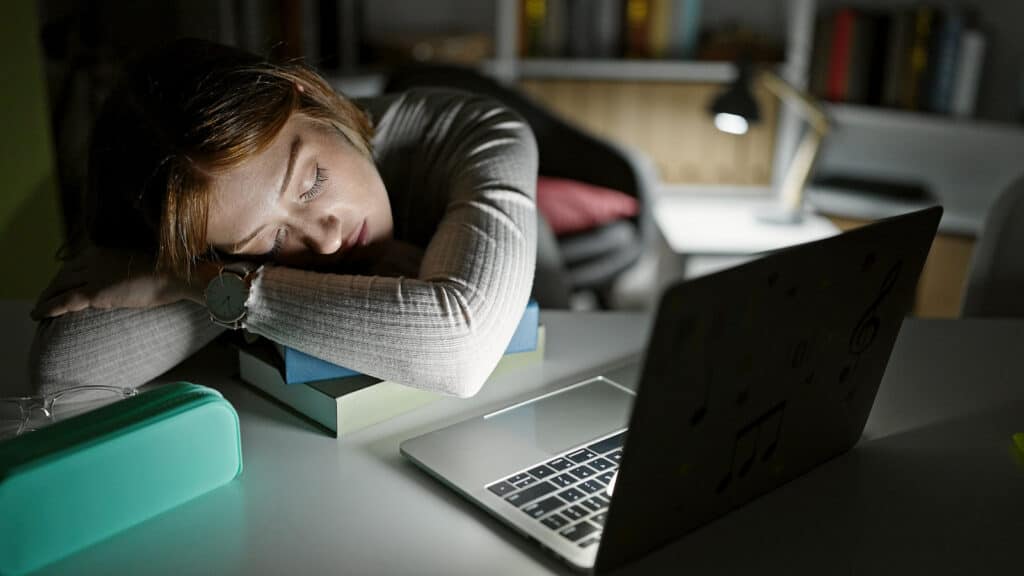It’s important to understand the impacts of sleep deprivation and lack of sleep on teens and college students. Knowing the recommended sleep time gives teens and university students a target to shoot for. Between 70% and 96% of college students don’t get enough sleep. Only half of university students sleep more than seven hours. That number goes even higher for kids in high school; almost three out of four of these students sleep less than seven hours a night.
Without enough sleep, students can suffer from chronic deprivation. This could have an impact on their mental well-being. For example, students who don’t sleep enough are more likely to have anxiety and depression. It also affects how students see themselves, with those suffering from insomnia often experiencing low self-esteem. It’s hard to juggle classes, sports, and social life while in high school or college. However, not getting enough sleep can impact grades, mental and physical well-being, and many other factors.
This guide provides tips and resources to help teens track their sleep and improve sleep quality. First, look at some of the ways poor sleep affects every aspect of life.
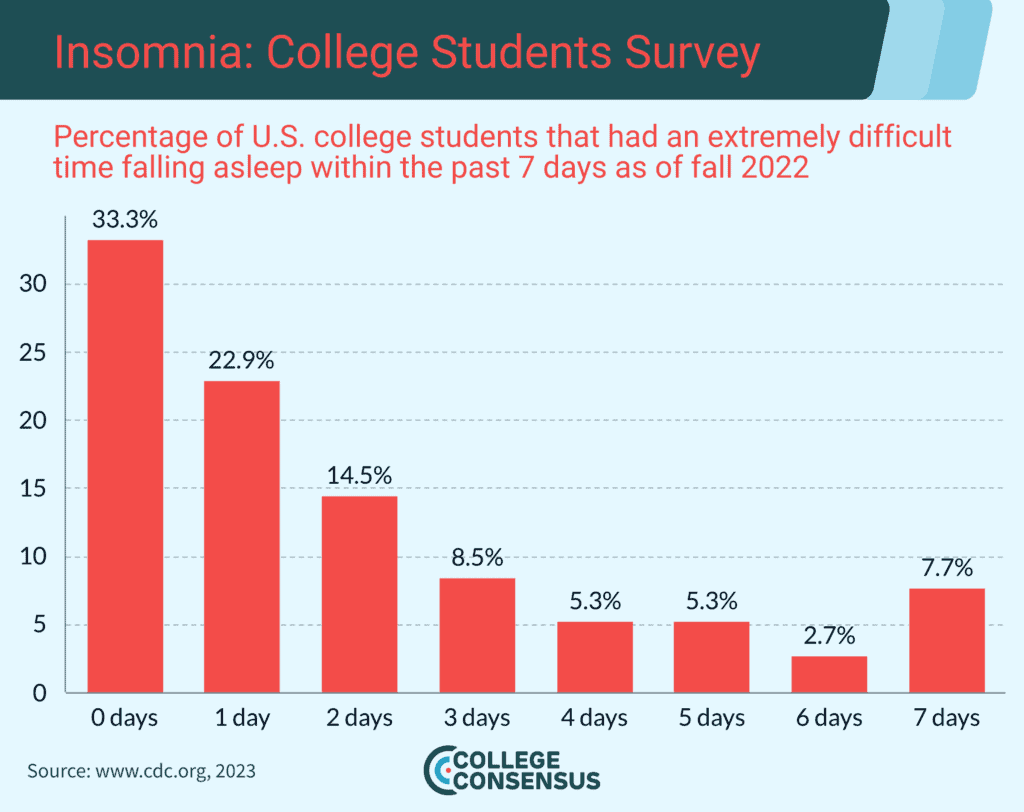
Impacts of Poor Sleep Hygiene
Here are some of the major concerns surrounding the growing trend of sleeplessness for college kids and teenagers:
- Increased risk of injuries: Sleep deprivation can impair attention, reaction time, and coordination, which can lead to accidents and injuries. For example, drowsy driving is a major cause of traffic crashes, especially among young drivers. Sleep deprivation can also cause mishaps at home, school, or work, such as cutting oneself with a knife or falling down the stairs.
- Inability to self-regulate: Sleep deprivation can affect your ability to control your emotions, impulses, and mood. This can result in aggression, irritability, impulsivity, and poor judgment. For example, sleep-deprived teens are more likely to engage in risky behaviors such as unprotected sex, substance use, and reckless driving. Sleep deprivation can also cause ADHD-like symptoms, such as inattention, hyperactivity, and distractibility.
- Substance use and risky behavior: Sleep deprivation can increase your craving for stimulants such as caffeine and nicotine to stay awake and alert. It can also increase your tendency to self-medicate with alcohol or other drugs to cope with negative emotions and sleep problems. For example, sleep-deprived teens are more likely to use alcohol to fall asleep or to deal with stress and anxiety. These substances can further disrupt your sleep quality and cycle, creating a vicious cycle of dependence and addiction.
- Sleep and mood: Sleep deprivation can have a significant impact on your mood and mental health. It can cause mood swings, irritability, depression, anxiety, and low self-esteem. For example, many teens reported that their mood was the first thing affected by sleep deprivation. Sleep deprivation can also exacerbate existing mental health conditions or increase the risk of developing them.
How does sleepiness impact everyday life for college students? About 50% of those surveyed report sleepiness during the day, and 7 out of 10 say they don’t get enough sleep.
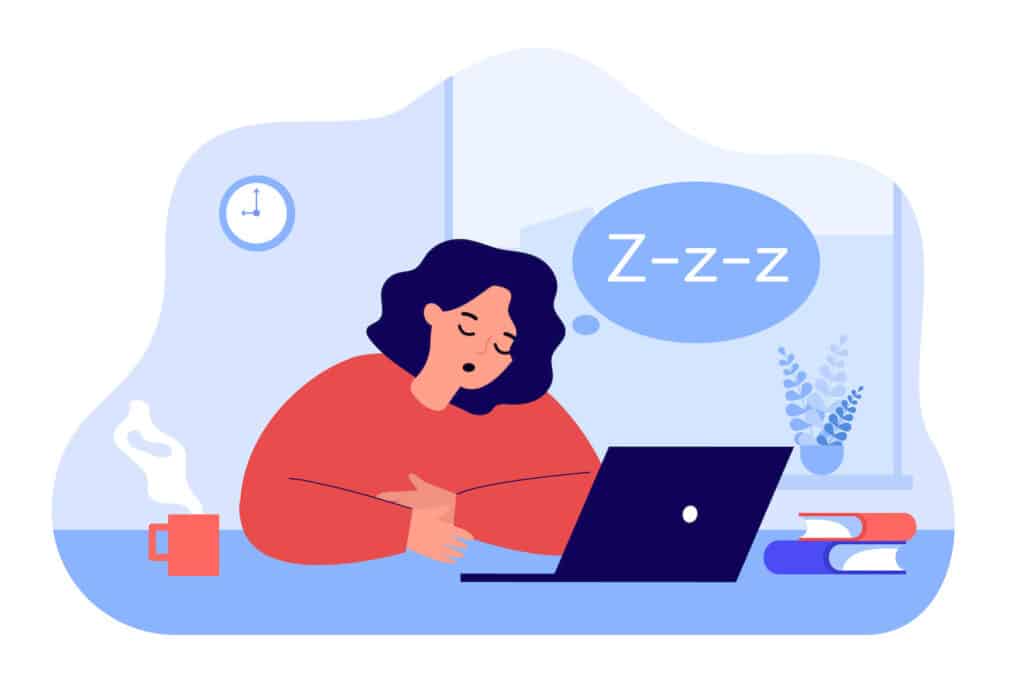
College students may suffer from lower grade point averages due to lack of sleep. This increases the risk of failing out of college, greatly impacting their future. The current epidemic of sleeplessness among college students can lead to drowsy driving, mood swings, and poor general health and well-being.
This guide looks at factors that contribute to sleep deprivation and how it affects cognitive functioning and physical performance. There are many ways students can improve their sleep hygiene. Online programs offer easy access to exercises and information that can lead to longer sleep times. Each student can work out the advice that works best for them. For example, some studies encourage naps while others say to avoid them.
To set teens up for success, there are dozens of resources that address sleep issues. These resources include websites and programs designed specifically for university and college students. Getting enough sleep affects the learning ability and health of college students. Future research may shed even more light on how to improve healthy sleep habits in teens and college students.
Resources:
These resources cover how the brain operates during sleep, where to find important sleep studies, and invaluable online resources for teen, college students, and their allies.
Brain Basics: Understanding Sleep: This National Institute of Neurological Disorders and Stroke website talks about the basic science of sleep, the stages of sleep, the effects of sleep deprivation, and the disorders related to sleep.
MIT Medical, Sleep: Learn tips on how to get better sleep. Massachusetts Institute of Technology provides information and links to other resources and services related to sleep health.
National Sleep Foundation: The NSF is a non-profit organization that aims to improve health and well-being through sleep education and advocacy. Peruse through dozens of useful articles, videos, podcasts, quizzes, and tools for a good night’s sleep.
Sleep Education: The American Academy of Sleep Medicine gives insomniacs comprehensive information on sleep, sleep disorders, treatments, and healthy habits. Don’t forget to check out the website’s directory of accredited sleep centers and news on sleep research and practice.
Sleep Foundation: This is an independent organization that conducts research and reviews on sleep products and services. Read helpful guides, advice, and recommendations on how to improve sleep quality and quantity.
Sleep Health Journal: This is a peer-reviewed journal of the National Sleep Foundation, and the site publishes original research, reviews, and commentaries on all aspects of sleep health. It covers topics such as sleep physiology, psychology, medicine, epidemiology, policy, education, and technology.
Sleep Hygiene Checklist: PositivePsychology.com provides a list of actions and habits that can help improve sleep hygiene. It also includes a scoring system to assess your current sleep hygiene level and suggestions for improvement. Teens and college students can pick up tips and reset their sleep habits.
Sleep Journal: This PDF document contains a template for keeping a two-week sleep diary. It helps track your sleep patterns, behaviors, and factors that affect sleep quality. It also provides tips on how to use the data to optimize your sleep schedule and environment.
Teens and Sleep: The National Sleep Foundation discusses the specific needs and challenges of teenagers regarding sleep. How much sleep do teens need? Learn how puberty affects their circadian rhythms, how school schedules interfere with their natural sleep cycles, and how they can cope with these issues.
World Sleep Society: Published by an international association of sleep professionals and enthusiasts, this site promotes global awareness of the importance of sleep. It organizes events such as World Sleep Day and World Sleep Congress, publishes newsletters and reports, and offers membership benefits and opportunities.
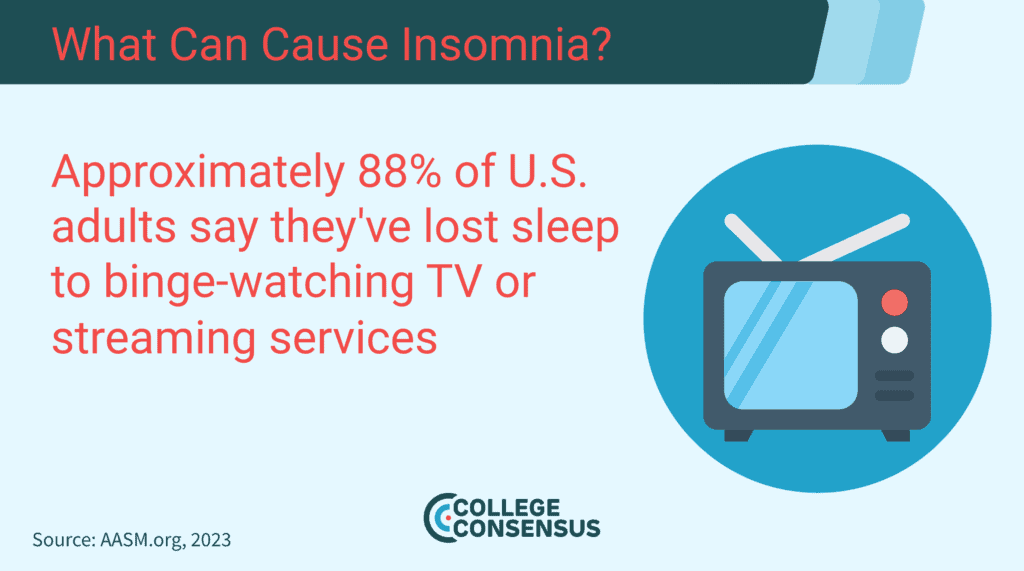
Journals and studies on sleep
There are many journals and studies that provide insight on the epidemic of poor sleep hygiene among high school and college students. The effects of sleep deprivation on college students include poor academic and athletic performance. Lack of sleep also has broader implications regarding mental health disorders.
Causes and consequences of sleepiness among college students: This article summarizes the current literature on the prevalence, causes, and effects of sleepiness among college students. However, it also provides hope in the form of potential interventions and recommendations for better sleep hygiene.
College Student Sleep: Relationship to Health and Academic Performance: This book chapter talks about the relationship between sleep and various aspects of health and academic performance among college students. It also provides suggestions for improving sleep habits on campus.
The Effects of Sleep Deprivation on College Students: This is a senior thesis that explores the impact of sleep deprivation on the cognitive, emotional, and physical functioning of fellow college students. Readers learn the common causes and consequences of insufficient sleep among this population.
Irregular sleep/wake patterns are associated with poorer academic performance and delayed circadian and sleep/wake timing: Explore the association between irregular sleep/wake patterns and academic performance, as well as circadian timing for college students. This resource mentions the effectiveness of a brief online intervention to improve sleep regularity.
Is sleep a luxury that college students cannot afford? This is an editorial that argues that sleep is not a luxury, but a necessity, particularly for college students. The human body needs sleep for learning, memory, and health purposes. This resource talks about the widespread problem of poor sleep.
Nightly sleep duration predicts grade point average in the first year of college: This site looks at the predictive value of sleep duration for academic performance in the first year of college. It also explores the mediating role of daytime functioning and the moderating role of academic motivation for students.
Psychosocial Correlates of Insomnia Among College Students: This research article identifies the psychosocial factors related to insomnia among college students. It explores the relationship between insomnia and academic performance.
Quality of Sleep and Depression in College Students: A Systematic Review: This review synthesizes the evidence on the relationship between quality of sleep and depression in college students. It suggests possible mechanisms and directions for future research.
Relationship between sleep habits and academic performance in university Nursing students: This is a research article that analyzes the relationship between sleep habits and academic performance in university Nursing students. It also compares the differences in sleep habits between high-performing and low-performing students, and provides recommendations for improving sleep quality.
What is Known About Students and Sleep: Systematic Review and Evidence Map: Readers will find an evidence map of the existing literature on students and sleep. It also identifies the gaps and limitations in the current knowledge base, and suggests areas for future research.
Campus-based sleep resources
Students don’t have to attend these colleges to benefit from these digital resources. Students, staff, and faculty may all face challenges getting enough sleep, as noted on the Algonquin site. Dartmouth and Cornell provide research and guidance on how to get enough sleep. Students and teens should review all these sites to find tools that work for them.
Algonquin College, Sleep: A web page that provides information, tips, and resources on sleep for Algonquin College students, staff, and faculty.
Cornell Health, Sleep: Students will find a comprehensive guide on sleep, including articles, videos, podcasts, workshops, and consultations. This is a must-read resource for sleep-deprived college goers.
Dartmouth College, Why Sleep? Here are many reasons sleep is essential! Dartmouth College students learn how to improve their sleep quality and habits to perform better in school and life.
Harvard Summer School, Why You Should Make a Good Night’s Sleep a Priority: This blog post talks about the benefits of good sleep for college students, and how to overcome the challenges of getting enough sleep in summer.
Oregon State University, Tips for Getting Good Sleep Oregon State University provides tips and strategies for getting good sleep and focuses on the challenges busy college students face.
SNHU, How Much Sleep Should a College Student Get? Students find answers to the question of how much sleep a college student should get, and how to achieve it.
UNC, Sleeping to Succeed: This web page highlights the connection between sleep and academic success for UNC students. Readers learn how to optimize their sleep environment and routine.
University of Georgia, Sleep: University of Georgia students turn to this website for information and resources on sleep. It has an interactive approach that incorporates articles, quizzes, apps, and programs.
University of Michigan, A College Student’s Guide to Better Sleep: This PDF document acts as a college student’s guide to better sleep. It covers topics such as sleep basics, sleep problems, and sleep tips.
University of South Florida, The Importance of Sleep for College Students: This USF web page emphasizes the importance of sleep for college students’ health and well-being, and how to improve their sleep hygiene and quality.
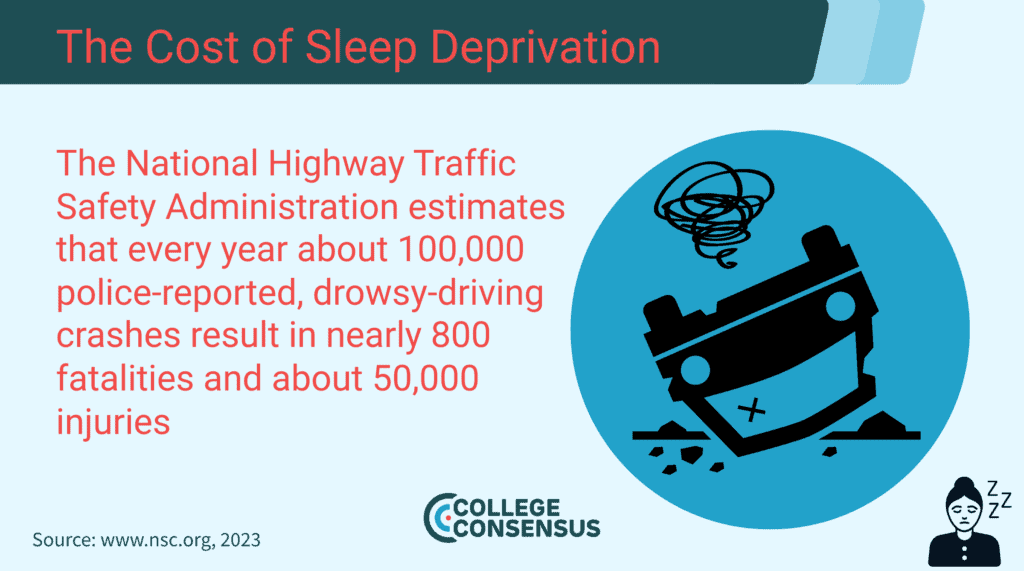
Government sleep resources
These heavy-hitting government resources include some of the most authoritative sources available, including the CDC, NIH, and the Walter Reed Sleep Research Center.
American Academy of Sleep Medicine: This professional society represents the field of sleep medicine. It accredits sleep centers, publishes journals and guidelines, and offers resources and services for patients and professionals.
CDC, Sleep in Middle and High School Students: The Centers for Disease Control and Prevention provides information and statistics on the sleep habits and health outcomes of middle and high school students in the United States. It also gives recommendations for improving their sleep quality and quantity.
CDC, Sleep and Sleep Disorders: This CDC site provides information and resources on various topics related to sleep and sleep disorders. It offers data and reports, publications and multimedia, programs and initiatives, and links to other organizations and agencies.
Medline Plus, Healthy Sleep: This is a web page from Medline Plus, a service of the National Library of Medicine. It also covers topics such as sleep disorders, sleep stages, sleep problems, sleep tests, and treatments.
NIH, Science of Sleep and Teens: National Institutes of Health explains the science of sleep and how it affects teenagers. It also answers some common questions about sleep and teens, such as how much sleep they need, how their circadian rhythms change, how their sleep affects their mood, memory, and health, and how they can improve their sleep habits.
NIH Sleep Health: This is a web page from the National Heart, Lung, and Blood Institute that provides information and resources on sleep health. It also supports research, education, and awareness on the importance of sleep for overall health and well-being.
National Sleep Foundation: This is a website of a non-profit organization that aims to improve health and well-being through sleep education and advocacy. It offers articles, videos, podcasts, quizzes, and tools on various topics related to sleep.
US Department of Health and Human Services: This website outlines the objectives and data related to sleep for Healthy People 2030, a national initiative that sets goals and targets for improving the health of Americans.
USDVA: The US Department of Veterans Affairs uses this site to provide information on how to sleep well. It also offers tips on how to cope with common sleep problems, such as insomnia, nightmares, snoring, or sleep apnea.
Walter Reed Sleep Research Center: This research center conducts studies on sleep in military personnel that can also benefit college students and teens.
College sleep resources
Medical school students are among the most sleep-deprived individuals on campus. The resources below shows students of every major how the sleep better in college.
8 Tips for Better Sleep in College: CollegeData provides eight practical tips for college students to improve their sleep habits and quality. Learn why good sleep is necessary for academic performance, health, and well-being.
Active Minds, Five Tips from a College Student to Form Better Sleep Habits: Active Minds is a mental health organization for students, that shares five tips from a college student who struggled with insomnia and learned how to form better sleep habits.
AMA, Advice for a med student’s must-have—a sound night’s sleep: The American Medical Association gives advice to medical students and addresses some common myths about sleep.
A Students’ Ultimate Guide to Great Sleep in College: Sleepopolis is a website that reviews sleep products and services, and provides a comprehensive guide on how to get great sleep in college. It also covers topics such as the importance of sleep and the effects of sleep deprivation.
A Study Guide To Getting Sleep During Final Exams: Here, the National Sleep Foundation provides a study guide on how to get enough sleep during final exams, one of the most stressful periods of college life.
American Academy of Sleep Medicine, College students: getting enough sleep is vital to academic success: This is web page underscores the importance of getting enough sleep. It also provides statistics on the prevalence and consequences of insufficient sleep among this vulnerable population.
Campus Mind Works, Sleep: This website supports the mental health of college students and discusses the relationship between sleep and mental health, the signs and symptoms of poor sleep quality, and treatments for sleep disorders.
Insomnia and Your Thinking: The Centre for Clinical Interventions is an Australian mental health service. The page introduces some cognitive techniques to change negative thoughts about sleep.
National Student Services, Top 10 Sleep Tips For Successful College Students: This resource provides 10 sleep tips for successful college students. It also explains how good sleep can enhance a student’s physical health, mental health, and social life.
Why Sleep Matters: Consequences of Sleep Deficiency: This web page describes the biological mechanisms that underlie these effects and the potential interventions that can mitigate them.
Resources for parents and caregivers
Learn just how much sleep is enough for teens and college students. Parents and caregivers play an important role in regulating sleep patterns for their teenagers. Here, they can get the tools and information needed to guide their children on how to achieve good sleep hygiene.
AASM, Five sleep tips for parents of tired teens: The American Academy of Sleep Medicine gives five sleep tips for parents of tired teens. It also explains the causes and consequences of insufficient sleep among adolescents.
Childmind, Complete Guide to Teenagers and Sleep: Childmind, a mental health organization for children and families, has put together a complete guide to teenagers and sleep. It covers topics such as the importance of sleep, the effects of sleep deprivation, the factors that influence sleep quality, and the signs and symptoms of sleep problems.
Collegiate Parent, Sleep and the College Student: This website supports parents of college students. It discusses the challenges and benefits of getting enough sleep in college, and how parents can help their college students achieve better sleep quality.
Health Children, Sleep: The site features articles, videos, podcasts, and tools on various topics related to sleep for children of different ages and stages.
Healthy Sleep Habits for Children and Teens: The Nationwide Children’s Hospital gives readers information on healthy sleep habits for children and teens. It also explains the role of sleep in growth and development, the factors that affect sleep quality, and the recommended amount of sleep for different age groups.
Johns Hopkins Medicine, Teenagers and Sleep: How Much Sleep Is Enough?: Johns Hopkins answers some common questions about how much sleep teenagers need, how their biological clocks change during puberty, how their lifestyle choices affect their sleep quality, and how they can improve their sleep habits.
NHS UK: Getting a Good Night’s Sleep: This website covers the stages of sleep, the causes of poor sleep quality, and strategies for improving sleep hygiene and addressing sleep disorders.
NIH: Getting a Good Night’s Sleep: The National Institute on Aging provides information on the changes in sleep patterns as people age and the common causes of poor sleep quality among older adults.
Sleep hygiene in children and young people: information for families: This PDF from Great Ormond Street Hospital provides information on sleep hygiene in children and young people. It also defines what sleep hygiene is, why it is important, what factors can affect it, and how to improve it.
Sleep in Adolescents: This is a web page from Nationwide Children’s Hospital that provides information on sleep in adolescents. It also describes the importance of sleep for physical, mental, and emotional health and sleep problems among teenagers.
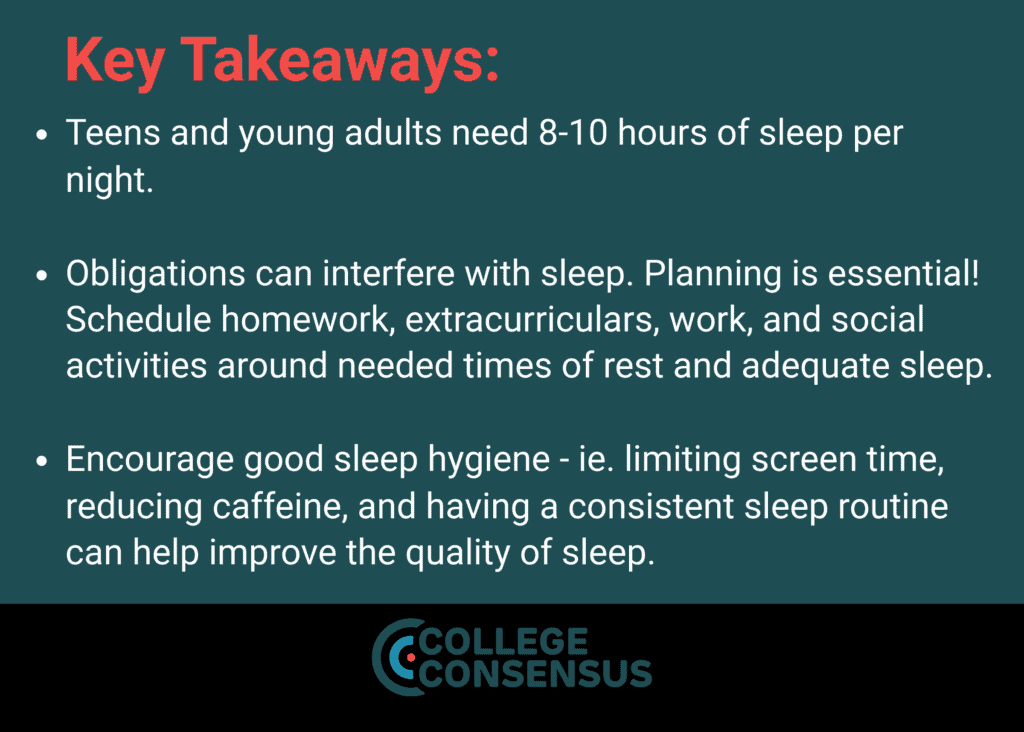
Meditation apps to help with sleep
Meditation quiets the mind, preparing it for sleep. Yet, many people have a hard time quieting their minds long enough to realize the full benefits. Well, there are apps that can help!
- Brain.fm: This is an app that uses artificial intelligence to create music that is designed to enhance focus, relaxation, and sleep.
- Breathe2Relax: This is an app that teaches diaphragmatic breathing, a technique that can help reduce stress, anxiety, and insomnia. It also provides instructions, exercises, and feedback on how to practice this skill effectively.
- Calm: Calm offers a variety of content and features to help users relax and sleep better. It includes guided meditations, sleep stories, soothing sounds, and daily wellness tips.
- Noisli: Users create and mix different sounds to create their own personalized sound environment. It also features a timer, a background color changer, and a text editor.
- Sleep Cycle: Students can use the microphone or accelerometer of their phone to track and analyze their sleep patterns. It also provides detailed statistics, graphs, and insights on the user’s sleep quality and habits.
- Sleep Easy: This app uses hypnosis to help users fall asleep faster and easier. It also features a voice guide, relaxing music, and positive affirmations.
- Sleep Reset: This app provides a personalized plan, daily tasks, coaching videos, and progress tracking to help users achieve their sleep goals.
- Sleep by Headspace: This app includes guided meditations, sleepcasts, music, sounds, wind downs, and night mode to create a relaxing and soothing bedtime routine.
- Timeshifter: This app provides a customized plan, notifications, tips, and feedback to help users optimize their exposure to light, caffeine, melatonin, and sleep.
- Yours: This app has a voice assistant, a library of sounds and music, and a community of users who share their meditations.
10 tips for great sleep hygiene
Safeguarding your mental health is one of the best ways to rest easier. Here are more tips to help college students and teens maximize their sleep time:
- Keep the electronics turned off in bed.
- Build decompression time to minimize activity so that your brain can shut down faster.
- Avoid stimulants for up to six hours prior to bedtime.
- Make your bedroom an oasis for your mind and body. That means no studying, eating, or web surfing from bed.
- Use earplugs to block out noise.
- Wear eye coverings to block out light that can prevent sleep.
- Don’t take afternoon naps if you have insomnia.
- Avoid consuming alcohol before going to sleep.
- Use the same sleep schedule on weekends and weekdays.
- Avoid exercise for several hours before going to sleep.
